

How Marie Kondo Organizes Her Brain - Motto. I’ve recently become a mother, which, as any other mom can tell you, has meant a dramatic lifestyle change.

What hasn’t changed, though, is the fact that I’m self-employed—which means I still have plenty of work to do to keep my business moving forward. So what do I do when, at the same time—often the exact same time—my baby daughter and my work both need me? Youtube. Lessons on professional learning from Star Wars. By Dawn Wilson What can educators learn from Star Wars?
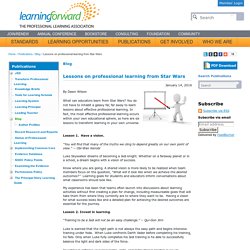
You do not have to inhabit a galaxy far, far away to learn lessons about effective professional learning. In fact, the most effective professional learning occurs within your own educational sphere, so here are six lessons to transform learning in your own universe. Recognizing and Overcoming False Growth Mindset. All educators care deeply about their students' motivation.
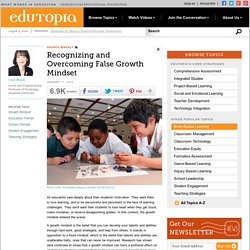
They want them to love learning, and to be resourceful and persistent in the face of learning challenges. They don't want their students to lose heart when they get stuck, make mistakes, or receive disappointing grades. Stop, Start, Continue: Conceptual Understanding Meets Applied Problem Solving. I recently became the Chief Academic Officer for the International Baccalaureate (IB) after more than two decades of working in and leading IB schools.
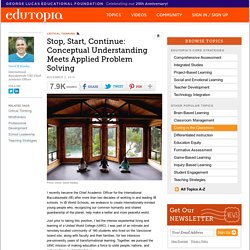
In IB World Schools, we endeavor to create internationally-minded young people who, recognizing our common humanity and shared guardianship of the planet, help make a better and more peaceful world. Just prior to taking this position, I led the intense experiential living and learning of a United World College (UWC). The Difference Between Pedagogy, Andragogy, And Heutagogy. The Difference Between Pedagogy, Andragogy, And Heutagogy by Terry Heick Jackie Gerstein’s passionate thinking about learning is some of my favorite to read.
She is rarely pulled down by trend or fad, but is unquestionably progressive and forward-thinking in her approaches to learning and thinking about learning. Her and I also both share a passion: self-directed learning. 201510. Resilience and Grit: Resource Roundup. There’s been a lot of talk lately about resilience, grit, growth mindset, and related concepts -- including the social and emotional skills associated with these factors and their importance for student well-being and academic success.
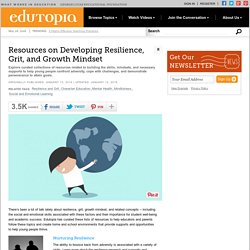
Edutopia has curated these lists of resources to help educators and parents follow these topics and create home and school environments that provide supports and opportunities to help young people thrive. Nurturing Resilience The ability to bounce back from adversity is associated with a variety of skills. Learn more about the resilience research and supports and strategies to develop resilience in young people. (10+ Resources)
Educational Leadership:Emotionally Healthy Kids. JaysMasterHandoutfor%20CAIM%202014.pdf. The education fad that’s hurting our kids: What you need to know about “Growth Mindset” theory — and the harmful lessons it imparts. One of the most popular ideas in education these days can be summarized in a single sentence (a fact that may help to account for its popularity).
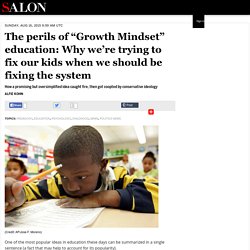
Here’s the sentence: Kids tend to fare better when they regard intelligence and other abilities not as fixed traits that they either have or lack, but as attributes that can be improved through effort. In a series of monographs over many years and in a book published in 2000, psychologist Carol Dweck used the label “incremental theory” to describe the self-fulfilling belief that one can become smarter. Rebranding it more catchily as the “growth mindset” allowed her to recycle the idea a few years later in a best-selling book for general readers. By now, the growth mindset has approached the status of a cultural meme.
Noncognitive Schooling: Do Students Need ‘Growth Mindsets’ and Grit to Succeed in the Classroom? Nestled within the New-Age-y sounding concept of “noncognitive factors” are fairly concrete examples of what parents and educators should and shouldn’t do to prepare students for the rigors of college and their careers.
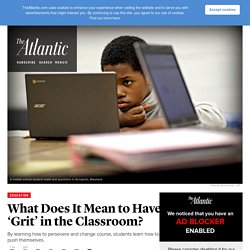
Gleaned from research into brain development and human behavior, a toolkit is emerging on how to best respond to and encourage students’ grit, persistence, and the ability to learn from one’s mistakes. If done right, the use of these concepts could change the classroom in significant ways. Students could see far fewer quizzes and tests. Teachers would follow students’ progress at a much more customized level to quickly identify where they are struggling, offering aid that is better targeted. Does Student Motivation Even Matter? — The Atlantic. Metacognition-eli.pdf. Do You have the Personality To Be an Inquiry-Based Teacher? By Thom Markham So far, the challenges of transforming education into a system capable of inspiring students to become skillful, creative, knowledgeable problem-solvers fall into familiar territory: What types of curriculum, standards, skills, strategies, and adaptations to classroom teaching methods will be necessary to do this?
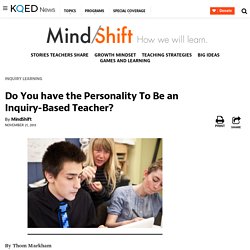
But it’s likely these will prove to be secondary questions. As education crosses the divide between a transmission model and an inquiry model, a more pressing issue will be apparent: How do we identify, attract, nurture, and train teachers who have an “inquiry-friendly” personality? The issue already is in view. When a teacher comes out from behind the lectern, leaves the front of the room, kneels beside a student to coach them through a problem, offers feedback designed to promote confidence and perseverance, and becomes a true partner in the learning process, the relationship between teacher and student automatically shifts.
Happiness Downloads. Five Ways to Bring Innovation Into the Classroom. What Would a ‘Slow Education Movement’ Look Like? Big Ideas Shelley Wright/PLPNetwork The many incredible innovations of the 20th century have sped up the pace of life in addition to giving many people more access to information and communication tools.
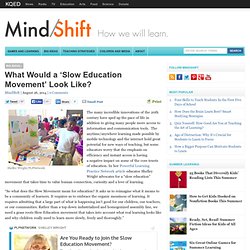
The anytime/anywhere learning made possible by mobile technology and the internet hold great potential for new ways of teaching, but some educators worry that the emphasis on efficiency and instant access is having a negative impact on some of the core tenets of education. In her Powerful Learning Practice Network article educator Shelley Wright advocates for a “slow education” movement that takes time to value human connection, curiosity and a love of learning. “So what does the Slow Movement mean for education?
The Chokehold of Calendars. Meetings may be toxic, but calendars are the superfund sites that allow that toxicity to thrive.

All calendars suck. And they all suck in the same way. Calendars are a record of interruptions. And quite often they’re a battlefield over who owns whose time. MindShift-GuidetoDigitalGamesandLearning.pdf. Start With Why > Learn Your Why. RSA Animate - The Empathic Civilisation.
How do teens think about body image, beauty and bullying? Body image, beauty and bullying. In TED-Ed Clubs, students are guided through the process of making a presentation on an idea they feel passionate about — and dozens of students in clubs around the world have boldly chosen to talk about how to combat negative body image, distorted images of beauty and the bullying that springs from rigid rules about appearance. Watch — but more important, listen — to these three inspiring perspectives on body image, beauty and bullying from teenagers in three different countries. A nice little graphic reminder of the life... The Power of Yet.
One word. Three letters. It is my favorite word to say to doubting students as well as skeptical teachers. Do you have a word in mind? FINAL%20Growth%20Mindset%20Lesson%20Plan%20(April%202015).pdf. Noncognitive%20Report.pdf.